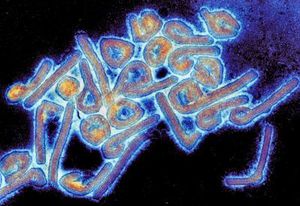Addition of Telomerase to Somatic Cells: Difference between revisions
(Created page with "==Introduction== Select a topic about genetics or evolution in a specific organism or ecosystem.<br> The topic must include one section about microbes (bacteria, viruses, fung...") |
No edit summary |
||
| Line 1: | Line 1: | ||
==Introduction== | ==Introduction== | ||
Telomerase is an enzyme that is able to regenerate telomeres. In humans, it is found in some tissues, such as male germ cells, activated lymphocytes, and certain types of stem cell populations. If present in somatic cells, it can turn them cancerous following mutation. Telomere shortening is one of the factors which contribute to aging so it is worthwhile to look into such an addition to develop anti-aging treatments. | |||
<br><br> | <br><br> | ||
Compose a title for your page.<br> Type your exact title in the Search window, then press Go. The MicrobeWiki will invite you to create a new page with this title.<br><br> | Compose a title for your page.<br> Type your exact title in the Search window, then press Go. The MicrobeWiki will invite you to create a new page with this title.<br><br> | ||
Revision as of 01:54, 28 October 2019
Introduction
Telomerase is an enzyme that is able to regenerate telomeres. In humans, it is found in some tissues, such as male germ cells, activated lymphocytes, and certain types of stem cell populations. If present in somatic cells, it can turn them cancerous following mutation. Telomere shortening is one of the factors which contribute to aging so it is worthwhile to look into such an addition to develop anti-aging treatments.
Compose a title for your page.
Type your exact title in the Search window, then press Go. The MicrobeWiki will invite you to create a new page with this title.
Open the BIOL 116 Class 2019 template page in "edit."
Copy ALL the text from the edit window.
Then go to YOUR OWN page; edit tab. PASTE into your own page, and edit.
At right is a sample image insertion. It works for any image uploaded anywhere to MicrobeWiki. The insertion code consists of:
Double brackets: [[
Filename: PHIL_1181_lores.jpg
Thumbnail status: |thumb|
Pixel size: |300px|
Placement on page: |right|
Legend/credit: Electron micrograph of the Ebola Zaire virus. This was the first photo ever taken of the virus, on 10/13/1976. By Dr. F.A. Murphy, now at U.C. Davis, then at the CDC.
Closed double brackets: ]]
Other examples:
Bold
Italic
Subscript: H2O
Superscript: Fe3+
Section 1 Genetics
Include some current research, with at least one image.
Sample citations: [1]
[2]
A citation code consists of a hyperlinked reference within "ref" begin and end codes.
Section 2 Microbiome
Include some current research, with a second image.
Conclusion
Overall text length should be at least 1,000 words (before counting references), with at least 2 images. Include at least 5 references under Reference section.
References
Edited by Nafeez Ishmam Ahmed, student of Joan Slonczewski for BIOL 116 Information in Living Systems, 2019, Kenyon College.

